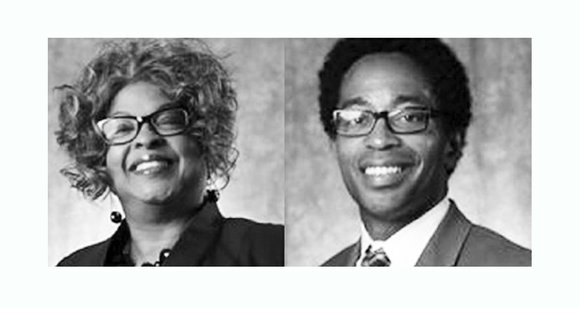Half of Ferguson City Council now black
Jim Salter and Jim Suhr | 4/16/2015, 8:16 a.m. | Updated on 4/17/2015, 11:31 a.m.
Associated Press
FERGUSON, Mo.
Two black candidates were among three people elected to the Ferguson City Council on April 7, tripling African-American representation in the St. Louis suburb where poor race relations have been a focal point since the August shooting death of an 18-year-old black youth by a white police officer.
The election means that half of the six-member city council in Ferguson, a town where two-thirds of the 21,000 residents are black, now will be African-American. The lone black incumbent councilman was not up for re-election. The mayor, who would break any tie votes, is white.
Voter turnout increased substantially from the previous election following a strong get-out-the-vote effort from labor unions and other national organizations. The town that drew only 12.3 percent of registered voters last April had a 29.4 percent turnout for the April 7 election, according to the St. Louis County Board of Elections. That was about double the overall turnout in other contests in St. Louis County, where Ferguson is located.
Results showed that Wesley Bell defeated another black candidate to win in the 3rd Ward, which includes the site where Michael Brown was shot.
Ella Jones defeated another black candidate and two white candidates in the 1st Ward. Brian Fletcher, a former mayor who is white, won a 2nd Ward race against another white candidate.
“This community came out in record numbers to make sure our voices were heard,” said Councilman-elect Bell. “When you have a community engaged, the sky is the limit.”
He described it as part of a healing and rebuilding process.
It was the first municipal election in Ferguson since former officer Darren Wilson fatally shot an unarmed Mr. Brown on Aug. 9.
The shooting sparked sometimes violent protests in the St. Louis area, and spawned a national “Black Lives Matter” movement to press for change in how police deal with minorities.
It also prompted a review by the U.S. Justice Department, which decided not to prosecute Mr. Wilson, who resigned in November. But the federal department released a scathing report blasting the city for racial bias in the police department, its courts and its government. Several city officials resigned following the review, including the city manager, the police chief and a municipal judge. The municipal court clerk also was fired for disseminating racist emails.
The new city council will be tasked with hiring replacements.
In the race for the 3rd Ward, Mr. Bell, 40, easily defeated 76-year-old retiree Lee Smith. Mr. Bell is a lawyer and a criminology professor who had to defend himself because of a third job — municipal judge in a neighboring town of Velda City that, like Ferguson, derives a large percentage of its budget from municipal court fines. Mr. Smith had support of two national labor organizations whose volunteers went door-to-door on his behalf.
Ms. Jones, who also had the support of a labor union, won easily in her four-person race. Mr. Fletcher, the former mayor who started the “I Love Ferguson” campaign after the unrest that ravaged the community, also won easily in the 2nd Ward.
A strong push was made after the shooting to register more black voters last year, but just 562 new voters were added to the rolls. In recent weeks, the focus has been on getting those who are registered to vote.
The high turnout came despite brutal weather. Strong storms, including lightning and heavy rain, tore through the region for several hours before noon.
The weather didn’t deter Eddie McNeil, 59, who has lived in Ferguson since 2013. He said he voted for Mr. Bell.
“I felt it was really important to come out in this election,” Mr. McNeil said. “In the past, I have to admit, that I haven’t come out to vote, but I felt it was important based on the things that have happened in Ferguson. I feel like it’s time that we get the kind of leadership in that we wanted.”
Mr. McNeil said racial profiling is a problem in St. Louis, citing the Justice Department report on Ferguson that found the town’s municipal court treated black residents more as sources of fines and fees to support the government than as citizens deserving of protection.
“I’m a pretty good guy, and I could tell you — see, the only time I’ve ever been to jail is based on a traffic stop,” Mr. McNeil said. “I wasn’t able to pay a ticket, and a warrant was issued for my arrest. You’re not allowing a citizen to be successful if he’s looking for a job and he has a warrant for his arrest, he’s got to worry about court costs ... He doesn’t have a job because he’s not qualified to have a job simply based on a ticket, a warrant, a failure to appear warrant. It’s just ridiculous.”







